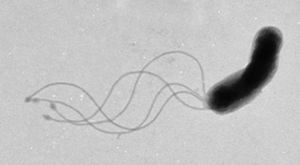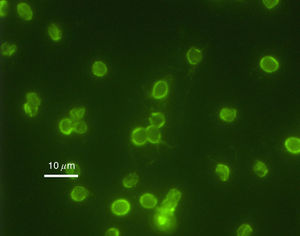Shock chlorination: Difference between revisions
No edit summary |
|||
| Line 23: | Line 23: | ||
Include some current research, with at least one image.<br><br> | Include some current research, with at least one image.<br><br> | ||
===<i>Helicobacter pylori</i>=== | |||
[[Image:Helicobacterpylori0.jpeg|thumb|300px|right|Electron micrograph of <i>Helicobacter pylori</i>, a microbe commonly found in public water sources. Courtesy: [http://mib.uga.edu/research/labs/hoover Timothy Hoover (Franklin College)]]] | [[Image:Helicobacterpylori0.jpeg|thumb|300px|right|Electron micrograph of <i>Helicobacter pylori</i>, a microbe commonly found in public water sources. Courtesy: [http://mib.uga.edu/research/labs/hoover Timothy Hoover (Franklin College)]]] | ||
<br><br> | |||
=== | ===<i>Cryptosporidium</i>=== | ||
[[Image:Cryptosporidium1.jpeg|thumb|300px|right|Immunofluorescence of <i>Cryptosporidium</i>, the microbe that caused an epidemic in Milwaukee in 1993. Over 104 deaths were credited to the waterborne microbe . Courtesy: [http://www.epa.gov/microbes/cpt_seq1.html H.D.A Lindquist (EPA)]]] | [[Image:Cryptosporidium1.jpeg|thumb|300px|right|Immunofluorescence of <i>Cryptosporidium</i>, the microbe that caused an epidemic in Milwaukee in 1993. Over 104 deaths were credited to the waterborne microbe . Courtesy: [http://www.epa.gov/microbes/cpt_seq1.html H.D.A Lindquist (EPA)]]] | ||
Revision as of 00:20, 4 November 2013
Introduction
From swimming pools to wells, chlorine is a common chemical used to disinfect water sources.
At right is a sample image insertion. It works for any image uploaded anywhere to MicrobeWiki. The insertion code consists of:
Double brackets: [[
Filename: PHIL_1181_lores.jpg
Thumbnail status: |thumb|
Pixel size: |300px|
Placement on page: |right|
Legend/credit: Electron micrograph of the Ebola Zaire virus. This was the first photo ever taken of the virus, on 10/13/1976. By Dr. F.A. Murphy, now at U.C. Davis, then at the CDC.
Closed double brackets: ]]
Other examples:
Bold
Italic
Subscript: H2O
Superscript: Fe3+
Microbial agents
Include some current research, with at least one image.
Helicobacter pylori

Cryptosporidium

Methods
Include some current research, with a second image.
Analyzing the success
Include some current research, with a second image.
Alternative methods
Include some current research, with a second image.
Conclusion
Overall text length should be at least 1,000 words (before counting references), with at least 2 images. Include at least 5 references under Reference section.
References
Edited by Erika Jensen, student of Joan Slonczewski for BIOL 116 Information in Living Systems, 2013, Kenyon College.
